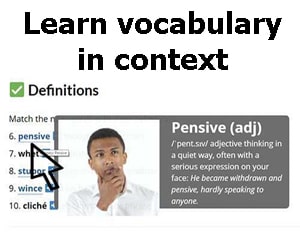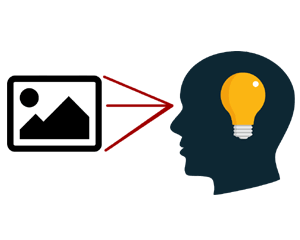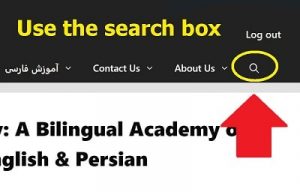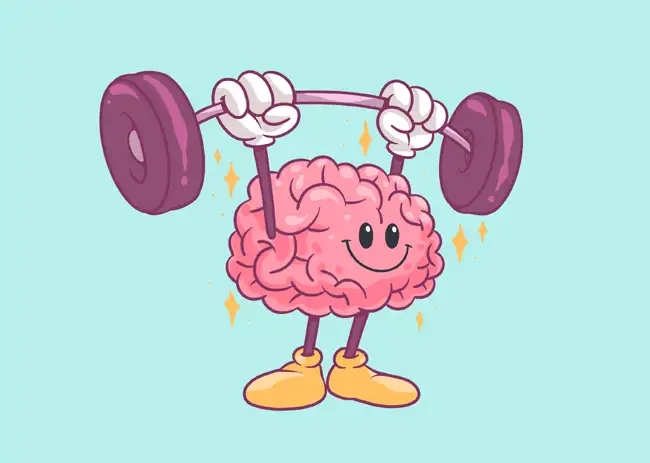Learn vocabulary with images in real context with clear illustrations, synonyms and antonyms. Make advanced vocabulary stick in your mind forever with expressive illustrations and images.
Why learn vocabulary with images?
It is quite natural to forget advanced vocabulary, particularly when they are intangible and abstract words, such as envy, begrudge, congenial, camaraderie, aloof, and the like. These words tend to be elusive and difficult to remember even for extremely intelligent English learners.
Neurologically speaking, images can help your brain retain abstract vocabulary in a more concrete and tangible way. A visual dictionary is ideal for making associations in your mind between the images and the corresponding concepts.
According to neurological studies, our brain is first an image processor and then a word processor. This means that learning vocabulary visually can tremendously facilitate the retention of the words because visual clues can greatly ease the process of recalling and retrieving elusive information such as abstract words.
According to Psychology Today website, the following two reasons prove that visuals are quite an effective method for learning abstract and advanced vocabulary:
- A great proportion of our sensory cortex is allocated to vision and sight.
- The section of our brain that processes vocabulary is relatively smaller in comparison to our visual cortex.
Learn abstract vocabulary with images
Abstract vocabulary, such as emotions and some verbs, are more elusive to our brain to retain and recall. In this regard, visual dictionaries and thesauruses can help you master abstract words in themes and situations, namely, business, education, appearance, and the like.
Learning vocabulary with images thematically (as opposed to alphabetically in normal dictionaries) can facilitate making associations or visual concepts in your brain with a more profound contextualization.
In LELB Society’s visual dictionary and thesaurus, our students and members can master advanced and abstract vocabulary in themes, such as psychology, music, architecture, etc. As you see, these words are semantically related, and there would be easier for your brain to learn them in related categories.
At LELB Society, you can easily find expressive illustrations for the most abstract vocabulary that you could not even imagine. You just need to be a registered member to learn vocabulary with images in real context. If you’re a new student, you can try our visual dictionary free before paid registration.
Look up words in our visual dictionary
We encourage you to use our search box on the black menu on top of the website to locate any word or phrase in our visual dictionary and thesaurus. Then you’ll be able to learn any abstract word with the following elements:
- Expressive visuals, such as images, illustrations, graphs, diagrams, etc. to activate the right hemisphere of your brain and tap into your full brain
- International phonetic alphabet to be able to pronounce words accurately in the most standard version
- Clear definition
- Synonyms
- Antonyms
- Parts of speech, e.g. noun, verb, etc.
- Real example in authentic context to practice reading comprehension and expand your vocabulary in context
- Text-to-speech functionality to listen to any selected text
- Related lessons that are thematically arranged
Making associations in your brain
As briefly stated above, you can learn vocabulary with images to make strong associations between the words and their meanings in your brain, which is so crucial for recalling the information in the future, or memorizing the words.
Conversely, using a bilingual dictionary, which is full of bare text with no picture, can confuse your brain in the long term, especially if you are a beginner. This is because of the fact that using translation from the source language into your mother tongue fails to arouse an optimal level of attention or consciousness in your brain to retain new advanced vocabulary.
Exaggerated visual aids for deeper mastery

To raise the level of your attention or consciousness while learning abstract vocabulary, you can make great use of our exaggerated illustrations or images for each vocabulary item. In this way, you can learn vocabulary with images while being engaged emotionally, which increases the likelihood of remembering the most abstract vocabulary for a longer period of time, if not forever.
Learn vocabulary in context

Visualization in vocabulary learning could be perfected with contextualization. Learning vocabulary in context is much better than learning vocabulary out of context in isolation. Contextualized vocabulary learning can encourage you to make educated guesses on the meaning of unseen words in relation to the previous and following words or phrases in context.
As implied in the preceding paragraph, when you learn vocabulary with images used in real or authentic context (as opposed to instructional materials), you’ll experience meaningful and deep learning enriched with visualization and contextualization.
Visual dictionary and thesaurus
At LELB Society, we have illustrated more than 2600 academic and advanced English vocabulary in context. This growing category of our English vocabulary includes all the vocabulary items of the best-selling books, such as the following:
- 504 Absolutely Essential Words
- 1100 Words You Need to Know to Pass Your Exams
- 601 Words You Need to Know to Pass Your Exam
- 500 GRE Vocabulary Flashcards (Kaplan)
LELB Society has the most comprehensive visual dictionary and thesaurus in the entire world, and our English vocabulary category is growing every day. The corpus of our English vocabulary is only accessible to our site members with free trial.

Our members can also learn vocabulary with images in context in our popular tags and various categories, such as English short stories, English documentaries, and the like.
Today’s visual word in context
Consider the visual word below as an example of our visual dictionary with thesaurus in real context.
- Conserve Definition in Context with Images Visual WordsConserve definition in context with images and real examples in visual dictionary and thesaurus /kənˈsɜːv/ (noun & verb) Conserve definition Verb: to protect or keep something from harm, damage or decay, preserve food from decay, save, safeguard, reserve, perpetuate, husband,…
Try our visual dictionary
To show you the real potential of our visual dictionary + thesaurus, we encourage you to search for any word or phrase in English in the search box below. Please note that you must be a registered member or request free trial to access the most comprehensive visual dictionary + thesaurus in real context in the entire world.
You can also take a tour at LELB Society to get a full grip on maximizing your educational experience in our bilingual academy, particularly on how to learn vocabulary with images.





